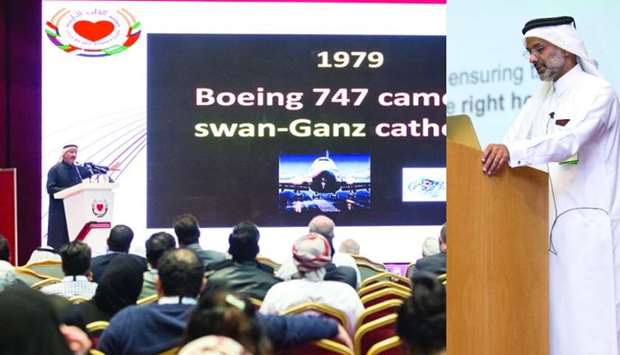Personalised medicine, robotic surgery and cardiovascular outcomes in type 2 diabetics in the treatment of heart disease were among the topics discussed during the recently held 14th Gulf Heart Association Conference.
More than 30 international experts and local faculty from various Gulf and Middle East countries led sessions attended by over 700 physicians and cardiology specialists. The annual conference, held for the third time in Doha since 2002, also included the 11th Gulf Vascular Society Symposium.
HE the Minister of Public Health Dr Hanan Mohamed al-Kuwari attended the opening ceremony of the conference. She commented on the importance of the event in providing an opportunity to highlight the key role that healthcare professionals play in promoting healthy behaviours as a strategy to reduce the incidence of heart disease.
“Cardiovascular disease is a leading cause of death in Qatar and across the world, with the majority of heart disease cases being preventable. While risk factors such as family history, gender and age do have an influence, unhealthy lifestyle behaviours, including tobacco use, unhealthy diet, excess body fat and physical inactivity, are the primary risk factors that contribute to the onset of this deadly disease,” said Dr al-Kuwari.
The minister added, "Healthcare professionals play a pivotal role in educating patients about risk factors, encouraging screening and treatment compliance, and perhaps most importantly, urging patients to modify their behaviour to reduce controllable risk factors.
"Together, we must remain focused on continuing our efforts to address cardiovascular disease through preventive health, research and cutting-edge treatments and technologies.”
Dr Hajar Ahmed Hajar al-Binali, chairman, 14th Gulf Heart Association Conference and 11th Gulf Vascular Society Symposium, noted that a major objective of the annual conference is to offer a platform to provide advanced knowledge, promote cardiovascular-related research in the region and facilitate the exchange of ideas and experiences among local and international leaders in the field of cardiology.
“By working together, we can improve the system of care surrounding our patients while also reducing the impact of heart-related illnesses on our individual health systems. This conference is an important opportunity to discuss comprehensive approaches to diagnosis, advanced treatment methods, and the latest developments in a variety of fields, including valvular heart disease, ischemic heart disease and medical treatment in paediatric pulmonary hypertension,” said Dr al-Binali.
The 11th Gulf Vascular Society Conference chaired by Dr Hassan al-Thani, head, Trauma and Vascular Surgery at Hamad Medical Corporation, was held during the final day of the conference and included a programme that focused on topics from the fields of vascular surgery, interventional radiology, cardiology, cardiothoracic surgery and clinical pharmacy.
"The conference was aimed at sharing the latest advances in vascular medicine, and specifically recent developments in this field in Qatar. This year's event featured sessions on traumatic aortic injury, the newest non-thermal vein ablation technique, and cost analysis for amputation in Qatar. It also offered an opportunity for cardiology specialists and surgeons to discuss opportunities for future collaborations and specifically the importance of establishing a peripheral artery disease registry in the GCC,” said Dr al-Thani.

